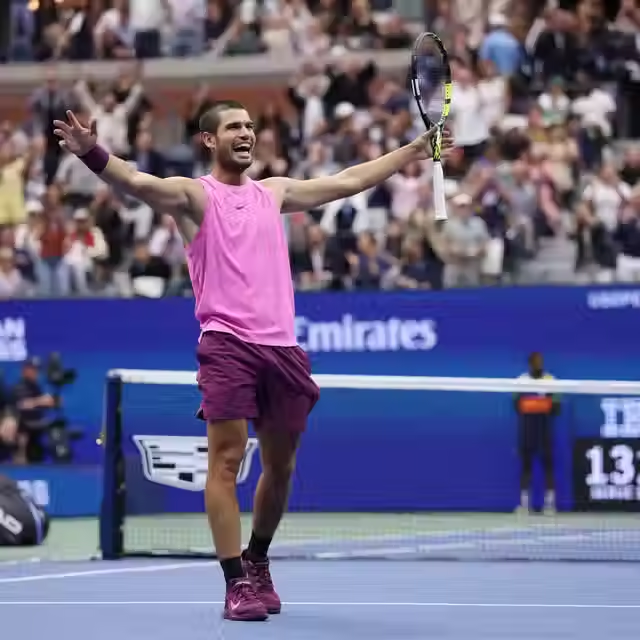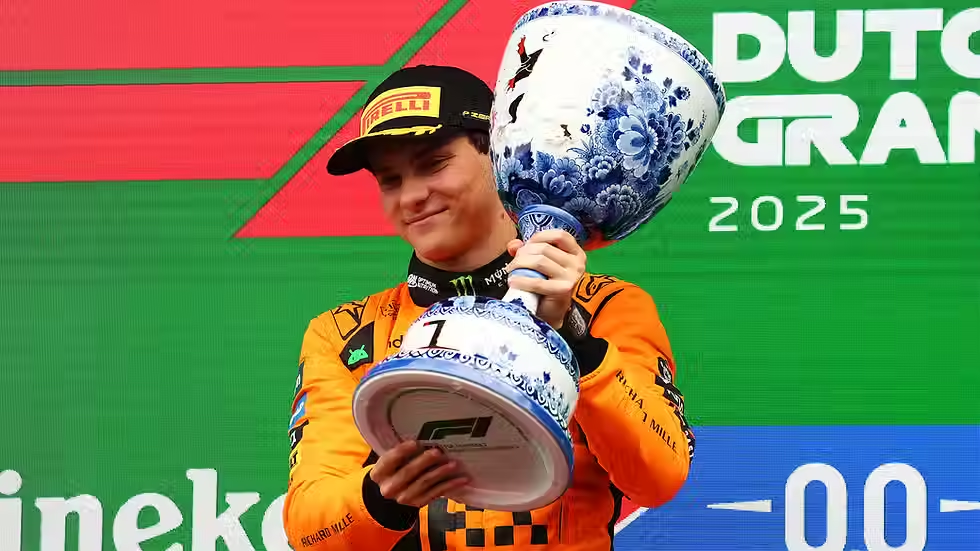Success begins with a 'S'! Ask Sabalenka and Sinner!
- lydiajulian1
- Sep 9, 2024
- 6 min read
The Grand Slam year ends with a touch of John Donne like reflection. For the first time since 1988 the Men’s and Women’s singles champions at the year’s first grand slam in Australia have also won the singles titles at the year’s end US Open. So, like Donne’s ‘Valediction Forbidding Mourning, these results, “makes me end where I begun.”
In 1988 the ‘start and end’ champions were Steffi Graf and Mats Wilander, who won 7 of the year’s 8 Grand Slam titles between them. This year it is Janik Sinner and Arnya Sabalenka.
In 1988 the world, courtesy of Gorbachev’s glasnost and perestroika, was hurtling towards the end of the Cold War. The predictable bi-polar world was about to fragment forever.
In some ways, the contemporary tennis world is undergoing a similarly radical reconstruction of its orthodoxies. For the first time since 2002, a Grand Slam title has not been won by either Federer, Nadal or Djokovic. The Women’s game for so long dominated by overwhelming champions and rivalries- King v Court; Navratilova v Evert; Graf v Seles, Williams v Williams- has now given us an entirely unpredictable array of champions. The US Open has had a different Women’s champion for the last eleven years.
For so many years during the Cold War, there was scarcely a year when the Western tennis powers of United States and Australia did not produce at least one male Grand Slam champion. Even though Taylor Fritz gladdened American hearts by making the Men’s Final, America’s last Grand Slam champion in any event remains Andy Roddick in New York in 2003.
This year Australia was heartened by four of its Men’s players making this year’s third round in New York and the victory of Max Purcell and Jordan Thompson in the Men’s Doubles.
Their victory was the first for an Australian Men’s pair since Woodforde and Woodbridge in 1996. Alex de Minaur achieved a personal first by achieving a calendar year quartet of Grand Slam quarter-finals; however, Australia must wait another year for its first Men’s Grand Slam singles champion since Lleyton Hewitt’s Wimbledon victory in 2002.
As with Australia’s recent Olympic success, Australian and American tennis has relied on its female players to achieve greater success in the last generation: Samantha Stosur and Ashleigh Barty for Australia and Lindsay Davenport, the Williams sisters, Sloane Stephens and Coco Gauff for America.
Having spent millions to protect Europe from the expansion of communism during the Cold War, America and the rest of the world have had to accept the domination of Europe on the world’s tennis courts.
Nadal, Federer and Djokovic placed their alliterative homelands- Spain, Switzerland and Serbia- at the heart of the Men’s tennis world. In 2024 Spain and Italy have divided the Men’s Grand Slam titles. Poland, Belarus and the Czech Republic have divided the Women’s spoils. And, of course, there is a Russian presence but the Ukrainian conflict condemns their players to anonymity.
European dominance was also evident in New York with the Women's and Mixed Doubles titles being won by a Latvian and Ukrainian pairing and an Italian duo: Ostapenko and Kichenok and Errani and Vavassori.


The end of the Cold War with the collapse of the Soviet Union led to much triumphalism in the Western world about the inevitable rise and consolidation of liberal democracies. The beasts of communism and fascism had been slayed by capitalism. Maoist China was now to be an outward looking nation whose economic development would inexorably align it with the West and reduce its traditional animus to the West. The rising middle class of China would be too engaged with capitalist nations to risk prosperity on an ideologically driven invasion of Taiwan.
As noted in my most recent post, it now seems that the West’s greatest enemy has become the West itself. France is the latest country to have democratic convulsions. After a typically Gallic languid pause in its political affairs since recent elections, President Macron seems to have angered all sides of politics with his selection of conservative 73 year old, Michel Barnier, to be the nation’s next Prime Minister and rule over a fractured parliament. The French are marching in great numbers in the streets. Again.
The West seems equally adrift in its response to the ongoing Middle East crisis. Many Israelis appalled by the Hamas attacks last October are now aghast at the direction of their nation’s government and the inability of Benjamin Netanyahu’s government to secure a deal to release Israeli hostages. As in Paris, the protests in Tel Aviv are compelling and confronting.
Faith in Israeli democracy is being tested when it needs to be at its strongest. The willingness of many in the West to indulge in moral equivalence when comparing the Israeli government and the Hamas terrorist organisation is bewildering.
Later this week, America will witness a debate between its Presidential candidates; however, one fears that neither the questions nor responses will be edifying.
South of America’s contested border, Venezuela is lurching towards the death of its democracy as the incumbent President contests the will of people by arresting nation’s Opposition leader and scores of journalists.
In Australia recent opinion polls suggest that disenchantment with major political parties is driving Australia towards a minority government next year, with all the instability that will ensue.
What may one ask, melodramatically, has happened to the great liberal consensus that buttressed Western democracies against fracturing? Have too many of us retreated into our social media created, self-centred hubs to care about the common good? Has the triumph of self-importance over a sustaining spirituality that provided morality and perspective wreaked social havoc? Has a cloud of collective guilt about the economic prosperity of the West settled in the minds of younger generations? Have too many people abandoned their faith in the importance of democracy, preferring to accelerate their angst about past and present cultural injustices and environmental challenges?
For most of her tennis career Arnya Sabalenka has been her greatest challenge on the court. She was a one person, one act study in fracture. Her serve would often dissolve into a series of double-faults that would cruel her chances of success. A streaky temperament would, sadly, reinforce structural weaknesses. She stole from herself matches that she should have been easily won, including last year’s US Open final.
Sabalenka seems to have learned how to screw her courage to the sticking place. In winning her first US Open title, Sabalenka did not drop a set. Like last year her opponent in the final was an American. Jessica Pegula, who had never progressed beyond a Grand Slam quarter-final was a formidable opponent, having beaten Swiatek in her quarter-final.
Unlike last year, Sabalenka did not disintegrate when faced with problematic moments in the final. She led 5-2 in first set, only to see Pegula fight back to five all, saving four set points at 4-5. Sabalenka rallied to hold her serve and break Pegula for a 7-5 margin. Similarly, in the second set, Sabalenka led 3-0, only to see Pegula race to a 5-3 lead. Sabalenka steadied to take the next four games, defied Pegula’s raucous hometown crowd, winning the second set and title 7-5 7-5.

Despite ongoing controversy about his recent exoneration from an investigation into the use of a banned substance, Janik Sinner played with the authority of an assured No.1 seed. Whilst the surprise defeats of Alcaraz and Djokovic provided him with a smoother run to the final- Medvedev did manage to take a set from Sinner in their quarter-final- Sinner’s all court game was simply a league above that of his opponents. Taylor Fritz strove away as well as he could, but was always one or two shots short of stretching Sinner.
Sabalenka and Sinner are clearly the world’s best hardcourt players. It may be a year when sporting success is linked to a surname beginning with a ‘S’. The world’s two best golfers not only have surnames starting with a S, but sound spookily similar; Sheffler and Schauffele.
John Donne was a master of the metaphor. In his ‘Valediction Forbidding Mourning’, Donne writes of a love that can endure separation as “like gold to airy thinness beat.” Only recently there was a common belief in the virtues of democracy and its ability to provide greater freedoms, liberties and prosperity than any other system of government. This belief was a golden thread that united the West. Presently, this thread is eerily and airily thin and at risk of unravelling. If it does where we all end is an unknown and unsettling prospect. At least, albeit briefly, the standard bearers of tennis have provided us with some stability and certainty.







Comments